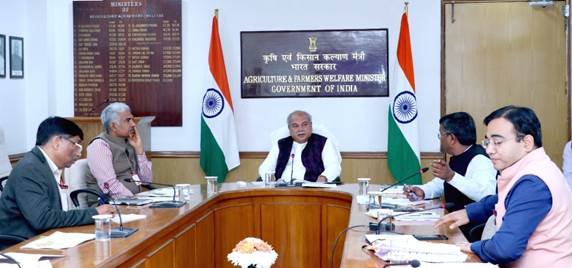Farm-to-Fuel ecosystem: Circular economy for Agri-waste
By Suhas Baxi, Co-Founder and CEO, BiofuelCircle
The government of India has announced to reach net zero emissions by 2070 and to meet 50 per cent of its electricity requirements from renewable energy sources by 2030. This is hugely significant for the global fight against climate change. Such targets can be met through increasing domestic production, adopting biofuels and renewables, applying energy efficiency norms, developing refinery processes, and achieving demand substitution. India has abundant indigenous, non-polluting, and virtually inexhaustible renewable energy resources, which makes biofuel a viable option. This environmentally friendly alternative also brings with it several possibilities to enable a positive transformation.
Why Biomass as Biofuel
India ranks in the top 3 countries by crop production. Agri-waste biomass holds the highest potential for small scale business development and mass employment in India. Characterised by low-cost technologies and freely available raw materials, biomass as biofuel has the potential to be one of the leading sources of primary energy. Aided by proven end-use technologies, biomass is not only environmentally efficient but also an economically sound option. Unfortunately, with millions of farmers in the workforce, farm waste is not considered as an avenue for extra income in India. Inefficiencies in the ecosystem such as a lack of delivery linkages, unorganised supply chain, no direct connection of the industry with the source, low benefit to the farmer, and lack of transparent pricing, among others, also exacerbate matters.
India imports nearly 85 per cent of crude oil, which incurs high import costs. On top of it, the air quality in urban India is deteriorating due to the growing vehicular traffic and emissions. This is where biofuel production can make a significant difference as it can seamlessly replace fossil fuels and help reduce the carbon footprint. Biofuels can pave the path to energy self-sufficiency and create a robust rural economy, thus aiding in overall economic development.
Factors enabling a biomass ecosystem
Although there lies a huge opportunity in harnessing the rural markets of biomass, there also is a distinct lack of cohesion and connectivity between the farmers and the industry.
Rural Storages
The seasonal availability coupled with round the year industrial demand, calls mechanisation and storage-related facilities in biomass catchment areas. The current shortage of mechanisation and unavailability of small storage facilities is clearly one of the constraints as far as the supply chain is concerned. Encouraging farmers/ farmer collectives and rural businesses to create small rural storages will help harness biomass and help generate higher value for rural participants.
Small Rural Businesses
Biomass is very low in density. Thus, despite its proven technical value as an energy source, the cost of logistics can make use of biomass uneconomical. Small briquette/ pellet manufacturing units located within 20 km distance from source will not only help solve the challenge of logistics, but also create stronger rural enterprise and economic value.
Small Business Finance
The challenge of storage and logistics will always call for decentralised small businesses as primary constituents of the biomass supply chain. Small storages, small processors, small aggregators; all based in rural areas will facilitate India’s drive to use more than 200 million metric tonnes (MT) of annual Agri-waste. A few thousand such businesses dotting the rural landscape will call for efficient small business finance for this sector. How do we elevate the biomass supply chain to the level of acceptance of say an automotive supply chain? Tier 3 and tier 4 suppliers of automakers benefit from their association with large Original Equipment Manufacturers (OEMs). Capital as well as working capital is available at competitive rates for these suppliers. How do we create a similar supply chain for biomass? Will it be possible for a small rural business to get competitive interest finance because it is a tier 3 supplier to a large credit rated company?
Supply Quality
A key thing to recognise about biomass is that we are dealing with a natural product. Thus, its quality may vary based on crop type, soil type, weather condition and a host of other factors. Industrial end use though calls for assured uniform quality. Defining quality standards, Standard Operating Procedures (SOPs) for quality assurance and creating knowledge and skills to deliver uniform quality, will help these rural businesses scale up. Several sectors including the tea industry have achieved standardisation, grading and price discovery methods that have made it a global industry. There is an urgent need to create a quality ecosystem for similar action in the biomass space.
Data Base
From the perspective of a bioenergy company, investing in technology is contingent on the dependability and predictability of stakeholders. For instance, if one must set up a bioenergy company, they must ensure that there is a steady supply of biomass for at least 300 days in a year. Therefore, having the information about demand, supply, storages, pricing etc. needs to become omnipresent. Availability of accurate and reliable information allows businesses to work on long term plans. Investment in the sector will grow when the supply chain becomes visible and transparent. Planning, forecasting, and investing in the sector will be aided if we are able to give a national character to the biomass supply chain through such databases.
The fledgling bioenergy technology sector will also benefit from this as lenders and investors will have a reliable basis for decision making.
Rural-Industrial Culture
Industries in India have mostly tended to be attached to urban centres. Thus, the entire organisation and cultural ecosystem that drives predictable and reliable operation from small rural businesses, will need human capital development. Trust between industrial buyers and rural sellers will be the direct outcome of these efforts.
Role of Digital Technology
A few million farmers, seasonal supplies, small rural businesses, round the year industrial demand and service providers for transport, quality, finance etc. makes for an interesting use case for digitalisation. To top it, traceability of biomass from its origin to its end use will create a reliable framework for carbon neutrality. Along the way, one also needs to address issues associated with incentivisation, price discovery, standardisation, and supply reliability.
While applications such as food delivery, transport services etc. which have a consumer end use have become popular, for biomass we need a platform that makes it easy for millions of farmers to participate, while providing a robust framework for industries too.
The biomass supply chain is still at a very early stage. We currently use about 20 per cent of the available Agri-residue biomass. At its maturity, the biomass product supply chain has a potential to be > $40 billion in annual turnover. The opportunity is for us to put a strong digital technology framework that creates ease, efficiency, reliability, and choice.
Looking Ahead
India has vast potential in terms of the 235 million tonnes of Agri-waste that is generated every year. We need to look at this as an all-new industry that will support a few million farmers, thousands of small rural businesses, and help India replace upwards of 17 per cent of its fossil fuel through biomass. At some level, this means increasing the rural household income while we become carbon neutral.
By Suhas Baxi, Co-Founder and CEO, BiofuelCircleThe






